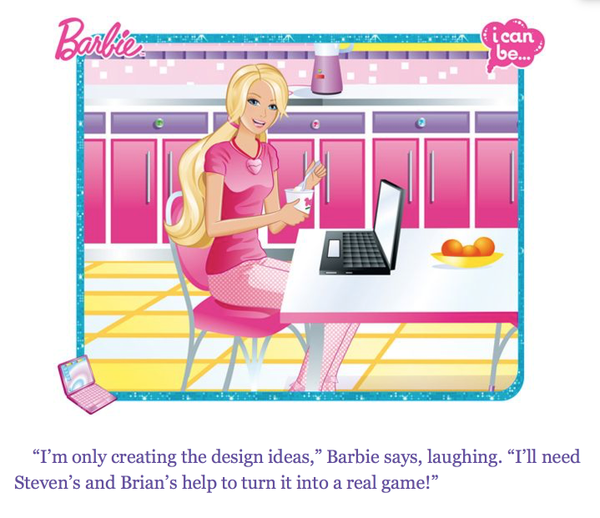Everyday sexism: Barbie can’t code
As is well known, the world of IT is a preponderantly male world. For instance, over at Wikipedia, under 20% of users who edit articles are women. Elsewhere, women tend to be thin on the ground at any professional IT gathering.
However, telling girls and young women that IT is not a field for them is just wrong. It isn’t; I know of many excellent women coders and programmers, ranging from web developers to those who write the code for microprocessors and mobile phone chips (although I shall refrain from identifying them here. Ed.). Indeed, the person regarded as the world’s very first programmer, Ada Lovelace, was – unsurprisingly given her name – a woman (posts passim).
It’s therefore with a sense of exasperation that I came across the image below this afternoon.

Mattel, makers of Barbie since 1959, should be ashamed of themselves if they are responsible for putting out the message that the world’s most prominent promoter of all things pink needs the help of 2 men to code up her game. It helps reinforce the erroneous stereotype that IT isn’t the done thing for girls or is too hard for them, especially as Barbie is aimed at young, impressionable minds. What’s more, the gender role stereotyping is further reinforced by having Barbie sat in a kitchen… Oh dear!
Update 21/11/2014: Mattel has since apologised for its crass mistake, according to CNET, to whom Lori Pantel, vice president of global brand marketing for Barbie gave the following statement:
“The ‘Barbie I Can Be A Computer Engineer’ book was published in 2010. Since that time we have reworked our Barbie books. The portrayal of Barbie in this specific story doesn’t reflect the Brand’s vision for what Barbie stands for. We believe girls should be empowered to understand that anything is possible and believe they live in a world without limits. We apologize that this book didn’t reflect that belief.

 Following on from news yesterday of the threat to the GNOME trademark from a series of applications for the same name by Groupon (
Following on from news yesterday of the threat to the GNOME trademark from a series of applications for the same name by Groupon ( The Foundation is currently facing a threat to its GNOME trademark from global deal-of-the-day website merchants
The Foundation is currently facing a threat to its GNOME trademark from global deal-of-the-day website merchants 
 In a linguistically diverse society, with many people speaking English as their second language, researchers at Bristol University are pioneering a new approach to help understand how factors such as accent influence communication.
In a linguistically diverse society, with many people speaking English as their second language, researchers at Bristol University are pioneering a new approach to help understand how factors such as accent influence communication. She said: “Reducing language barriers is a pressing social and educational challenge, especially in countries like the UK where the linguistic palette is very rich.
She said: “Reducing language barriers is a pressing social and educational challenge, especially in countries like the UK where the linguistic palette is very rich. Debian 8, codenamed Jessie, will be the next stable release of the Debian GNU/Linux operating system.
Debian 8, codenamed Jessie, will be the next stable release of the Debian GNU/Linux operating system.
